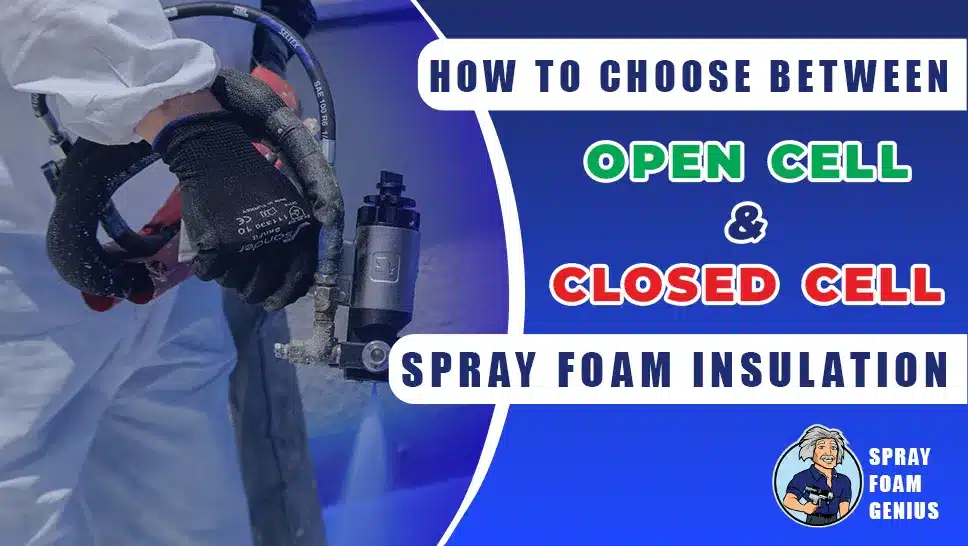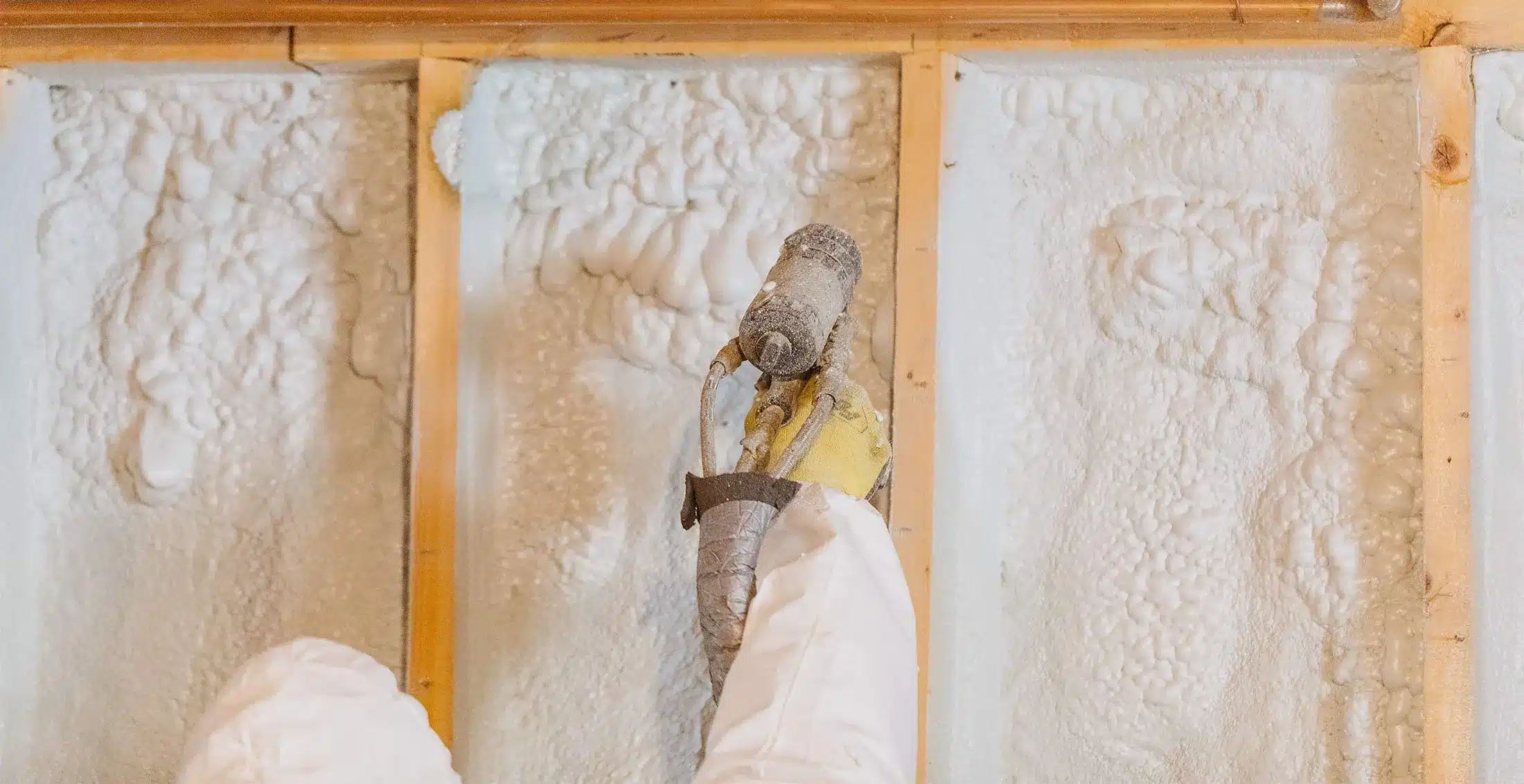
Choosing the right insulation for your property can be challenging, especially when it comes to selecting between open cell and closed cell spray foam insulation. At Spray Foam Genius Marketing, we specialize in helping property owners make informed decisions about their insulation needs. This comprehensive guide will provide you with a detailed understanding of both types of spray foam insulation, their key differences, and which option may be best for your specific requirements.
Understanding Spray Foam Insulation
Spray foam insulation is a popular choice for both residential and commercial properties due to its excellent thermal performance and air-sealing capabilities. Spray foam expands upon application, filling gaps and voids to create a seamless barrier that improves energy efficiency and indoor comfort. There are two main types of spray foam insulation: open cell and closed cell.
Open Cell Spray Foam
Open cell spray foam consists of a less dense, flexible material with cells that are not completely closed. This allows air to fill the open spaces within the foam, resulting in a softer and more pliable product. Open cell foam has several key characteristics:
- Lower Density: The foam is less dense, making it more flexible and easier to apply in various shapes and sizes.
- Air Permeability: The open cells allow for some air movement, which can improve indoor air quality by reducing the buildup of moisture and pollutants.
- Soundproofing: The foam’s structure makes it effective at absorbing sound, making it a popular choice for soundproofing applications.
Closed Cell Spray Foam
Closed cell spray foam is denser and more rigid compared to open cell foam. The cells within the foam are fully encapsulated, creating a more impermeable barrier. Key features of closed cell foam include:
- Higher Density: This results in a more rigid and durable insulation material.
- Moisture Resistance: The closed cell structure makes it highly resistant to moisture, effectively acting as a vapor barrier.
- High R-Value: Closed cell foam offers a higher R-value per inch, providing superior thermal insulation.
Comparing Open Cell and Closed Cell Spray Foam Insulation

To make an informed decision, it’s essential to understand the key differences between open cell and closed cell spray foam insulation. Here’s a detailed comparison of both types:
R-Value and Insulating Efficiency
- Open Cell Spray Foam:
- R-Value: Typically around 3.5 to 3.8 per inch of thickness.
- Efficiency: Provides good thermal insulation but is less effective in extreme weather conditions compared to closed cell foam. The lower R-value means that thicker applications are necessary to achieve the desired insulation levels.
- Closed Cell Spray Foam:
- R-Value: Generally ranges from 6 to 7 per inch of thickness.
- Efficiency: Offers superior thermal insulation and is highly effective in maintaining consistent indoor temperatures. Its higher R-value allows for thinner applications while still achieving high performance.
Moisture Resistance
- Open Cell Spray Foam:
- Moisture Absorption: Not waterproof and can absorb moisture if exposed. It is best used in areas with minimal moisture concerns, such as interior walls and ceilings.
- Applications: Ideal for dry environments or as part of a comprehensive moisture management system.
- Closed Cell Spray Foam:
- Moisture Barrier: Highly resistant to moisture and acts as an effective vapor barrier.
- Applications: Perfect for use in basements, crawl spaces, and areas prone to high humidity or water exposure.
Soundproofing and Acoustics
- Open Cell Spray Foam:
- Sound Absorption: Excellent at reducing noise transmission and improving soundproofing. Its ability to absorb sound makes it a popular choice for areas where noise control is a priority, such as home theaters or offices.
- Benefits: Enhances acoustic comfort by minimizing noise from external sources and between rooms.
- Closed Cell Spray Foam:
- Sound Insulation: Provides some degree of soundproofing but is less effective than open cell foam in this regard. Its primary benefits are in insulation and moisture resistance.
- Benefits: Useful in scenarios where soundproofing is a secondary consideration to thermal and moisture protection.
Cost and Application
- Open Cell Spray Foam:
- Cost: Generally more affordable than closed cell foam. The lower density and ease of application contribute to cost savings.
- Application: Expands rapidly and is easier to apply in larger areas. However, achieving the desired R-value may require thicker layers, which can impact overall costs.
- Closed Cell Spray Foam:
- Cost: More expensive due to its higher density and superior performance characteristics. The initial investment may be higher, but the long-term benefits can justify the cost.
- Application: Requires careful application to ensure proper coverage. Professional installation is recommended to achieve the best results and ensure compliance with building codes.
When to Choose Open Cell Spray Foam Insulation
Open cell spray foam insulation is an excellent choice for certain applications:
Interior Applications
Open cell foam is ideal for use in interior spaces where moisture is not a significant concern. It is commonly used in:
- Walls: Provides good insulation and helps with soundproofing.
- Ceilings and Attics: Effective in reducing heat loss and improving indoor comfort.
Soundproofing Needs
If soundproofing is a priority, open cell spray foam excels at:
- Reducing Noise: Ideal for areas where noise reduction is important, such as home theaters, recording studios, and offices.
- Improving Acoustic Performance: Enhances overall acoustic comfort by absorbing sound and minimizing noise transmission.
Budget-Conscious Projects
For those looking to manage costs, open cell spray foam offers:
- Affordability: A more cost-effective option for larger projects due to lower material costs and easier application.
- Flexibility: Suitable for a variety of applications without the need for extensive preparation or high costs.
When to Choose Closed Cell Spray Foam Insulation
Closed cell spray foam insulation is suitable for applications that require superior performance:
Exterior and High-Humidity Areas
Closed cell foam is ideal for use in environments where moisture resistance is crucial:
- Basements and Crawl Spaces: Provides a durable barrier against moisture and helps prevent mold and mildew growth.
- Exterior Walls: Effective in protecting against water infiltration and maintaining energy efficiency.
Extreme Weather Conditions
In areas with extreme temperature variations, closed cell foam offers:
- High R-Value: Superior thermal insulation helps maintain consistent indoor temperatures and improves energy efficiency.
- Durability: The rigid structure withstands harsh weather conditions and maintains performance over time.
High-Performance Needs
When maximum insulation performance is required, closed cell foam provides:
- Enhanced Insulation: Delivers a higher R-value per inch, making it suitable for projects that demand high energy efficiency.
- Structural Integrity: Adds rigidity to structures and helps improve overall building durability.
Professional Installation and Considerations
Regardless of the type of spray foam insulation you choose, professional installation is essential for achieving optimal performance. At Spray Foam Genius Marketing, we offer expert services to ensure that your insulation is applied correctly and meets all safety and performance standards.
Benefits of Professional Installation
- Expertise: Our team has extensive experience and knowledge in applying spray foam insulation, ensuring proper coverage and performance.
- Quality Assurance: Professional installation guarantees that the insulation meets industry standards and complies with local building codes.
- Safety: Proper installation minimizes risks associated with incorrect application and ensures a safe and effective insulation solution.
Choosing the Right Contractor
When selecting a contractor for spray foam insulation, consider:
- Experience: Look for a contractor with a proven track record in installing both open cell and closed cell spray foam insulation.
- Credentials: Ensure the contractor is licensed and insured to perform insulation work in your area.
- Reviews: Check customer reviews and testimonials to gauge the quality of the contractor’s work and customer service.
Ready to Make a Decision? Contact Us Today!
Choosing the right type of spray foam insulation for your property is a significant decision that can impact your energy efficiency, comfort, and overall costs. At Spray Foam Genius Marketing, we are dedicated to helping you make the best choice for your needs. Our team of experts is here to provide professional advice, expert installation, and comprehensive support.
Call us at 877-840-FOAM for USA and 844-741-FOAM for Canada visit our website at sprayfoamgeniusmarketing.com, or email us at [email protected] to schedule a consultation and learn more about your insulation options.
- Social Media Marketing for Spray Foam Businesses: What Works in 2025? - February 6, 2025
- Best SEO Strategies for Spray Foam Insulation Contractors to Rank #1 on Google - February 6, 2025
- What is Spray Foam Insulation? Benefits and Applications - February 5, 2025

